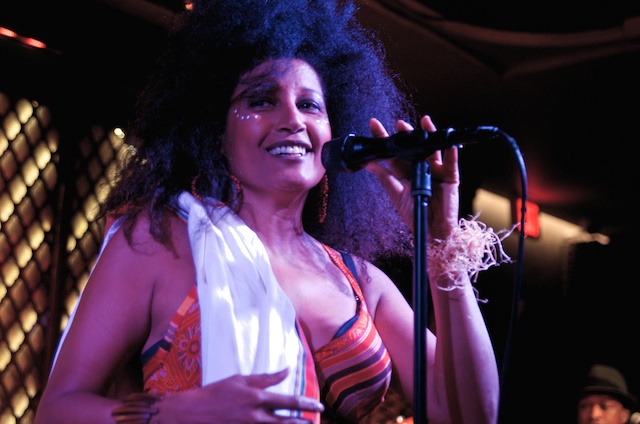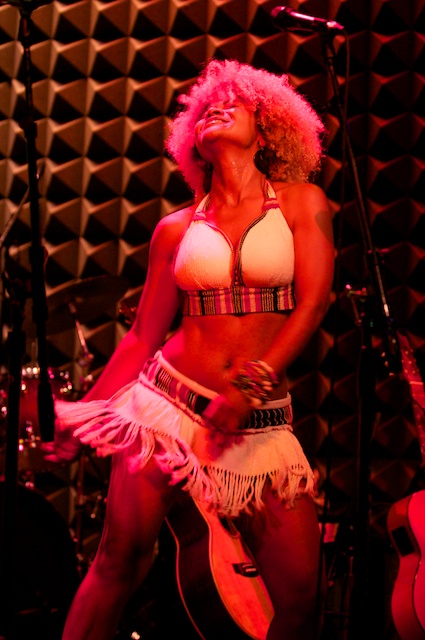Wake Up Madagascar is a group of Malagasy musicians that formed to spread awareness about deforestation in their homeland, while also introducing audiences to the rich and unique musical traditions of Madagascar. You might know something about that if you've heard our three-part Hip Deep series. Led by New York-based singer Razia Said, the group also includes legendary salegy singer Jaojoby, his wife's band Saramba, and virtuoso guitarist Charles Kely. On their summer tour through the U.S. and Canada, we caught the group at Montreal's Nuits d'Afrique and Joe's Pub in New York. To hear highlights from that performance, check out the program "Afropop Live 2014." A week earlier in Montreal, Afropop producer Jesse Brent spoke with Razia about Madagascar's environmental issues and her diverse musical upbringing.
Jesse Brent: How did Wake Up Madagascar start?
Razia Said: We started this whole venture as Mifohaza Masoala [Wake Up Masoala] in 2011. I wanted to raise awareness about the environmental situation in Madagascar, so I decided to go ahead and create this Mifohaza Masoala, which was a festival on the edge of the national park of Masoala. I invited a few artists and one that I really wanted to have with me was Jaojoby, because he’s been working for a long time on environmental issues and has songs talking about it. And right away, he said, “Yes, I’ve been fighting for this for a long time, so together we’ll do more.” And then I invited Charles Kely, who’s a guitarist that I found amazing and had been working with me, touring for the Zebu Nation album. And Saramba, which is led by the wife of Jaojoby, happened to have her own group. So we tried to make it self-contained and having four different artists gives it more of a feeling of a festival. We worked with a lot of nonprofit organizations in Madagascar--mostly with Tany Meva and the Wildlife Conservation Society. We planted 20,000 trees in the forest before the concert, and we invited a lot of local groups from that area of Masoala on the northeast of Madagascar to come and really express themselves in what they thought about the forest and what’s happening with the forest. And I was amazed to see that there were so many little groups. Some people walked for three days to get to that place, so that they could be heard. It was really great. For me, it was amazing to be close to my hometown in this forest. I grew up around that forest. My grandfather had some plantations around that forest, and everybody knew him in the area. People kept saying, “Thank you for not forgetting us.” That’s something that really went straight to my heart.
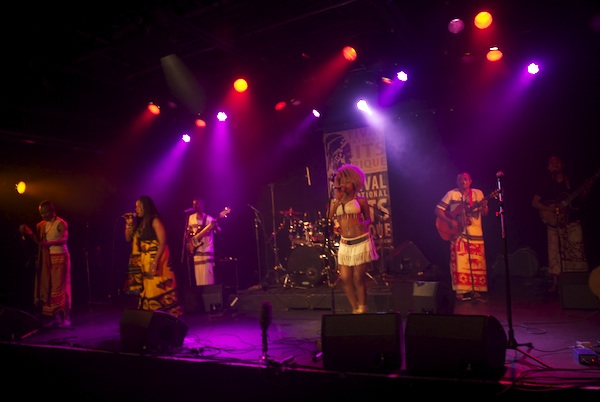 Saramba and Jaojoby on stage at Nuits d'Afrique (Brent 2014)
Saramba and Jaojoby on stage at Nuits d'Afrique (Brent 2014)
After that concert, it was a little bit difficult to get things going in Madagascar with the political situation and everything that was going on. I thought, "Well, this is becoming really not so secure, as well," because we were really in the heart of illegal logging, and this is happening right here in my hometown of Antalaha. Even Jaojoby was like, “Are you sure, Razia? We don’t want to die like heroes here” [Laughs]. So we actually had to go to see the minister of the environment and ask to have some security with us, and he promised to have security for us throughout the whole trip. We found out later that we never had security. But everybody was just so welcoming and we really managed to communicate. People are aware that we need to keep our forests in order to not have these big cyclones, because with less forest, the wind cannot be stopped. They realize also that all of a sudden, the wells next to their houses that used to have water don’t have any water. They have to walk an hour to go get water. And they understand that the roots are what’s keeping the water going. So, it’s an issue of the forests; it’s an issue of the animals that are living in the forests, but also, it’s a human and social issue. Anyway, after this experience, we just got lucky that the [Republican] Tea Party was having--almost the same day or a couple of days before--a concert in Tennessee to support the illegal logging because Gibson was accused of importing illegal wood from Madagascar. That attracted a lot of attention to what we were doing.We timed it perfectly well, which was pure chance. It just happened to be like that. We got a lot of coverage, which was great. We got to the population and we communicated with them. They’re saying, “Bring us economic alternatives. Because when we offer to cut some wood, even if it’s poorly paid, it’s better than not having any money.” This whole deforestation is really tangled with sustainable economic growth that should happen around these areas, so that people wouldn’t have to go and cut the wood; so that people wouldn’t have to burn their forests so they can grow a crop of rice. I’m trying to make a call to all these multinational corporations that are going into this country and taking a lot of our wealth, and not leaving anything behind. These are the people that we really have to approach, and to put that pressure on people, really we need the press. That’s why I say the press is really the most important thing. First, we need to be aware. And then we can find solutions. This was a long introduction [Laughs].
Mifohaza Masoala was in 2011. And the next year, I decided, “OK. I’m based in New York. This is the place where I can probably do the most--getting to the press and getting people around the world to know about the wealth of Madagascar--all these endemic species that we have in the flora, in the fauna, and this amazing music that we have. So this is where Wake Up Madagascar was born. And I decided that because the people that I called for Mifohaza Masoala--Jaojoby, Saramba and Charles Kely--came with me in this big adventure in the forest and risked their lives, and really believed that this was a good cause, I wanted to continue with them. I got them to come to the States and we did the first U.S.-Canada tour in 2012, which was really very well received. Of course, as usual, we’re doing it on very very very low budgets, trying always to get some people to help us to make it happen, and it’s not easy, especially in a time like this when nobody really has any money. We should really go and target these big multinationals, but it’s not an easy thing. The first thing is we go to our friends; we go to the people that we know that are doing work in Madagascar. I’m working with EIA (the Environmental Investigation Association). They always give some money behind the tour, because they believe this is the way we should inform people on what’s going on with the environmental situation in Madagascar. I work with Sunshine Comes First. These are people that are also very helpful, and they support every project that I do. Besides that, we’re asking our friends if they can give 50 dollars, 20 dollars. That’s how we create a tour. Yesterday I had an interview with a lady who was asking me, “With the money that you’re making during the tour, what are you bringing home and actually doing in Madagascar?” And I said, “Well, I’m sorry, but after we do the tour, we don’t even have enough to do the tour.” The idea that I’ve been talking about with Saramba, Jaojoby and Charles is to get a piece of forest in Madagascar that we would actually directly protect from what we can raise from Wake Up Madagascar in the future, to show how spreading culture and talking about the real problems of the country can really bring some solution and conserve this specific spot of forest and then create some eco-tourism from there and create some jobs around that forest to make people understand that by keeping the forest alive, there’s so much more to gain. This is one of the goals that we would like to accomplish. And of course, it’s a challenge, but at the same time, the good thing is to see the reaction. Here in Canada, people are reacting in such a positive way and they are really giving the good energy to help out and spread the word and it’s been terrific. It’s been really great. And in the States, whoever has seen the show, and seen us on stage, they’re really touched by what we’re doing. I think that it goes straight to people’s heart. And music is the right vehicle to do this. Through music, you manage to touch people’s heart, and really come through.
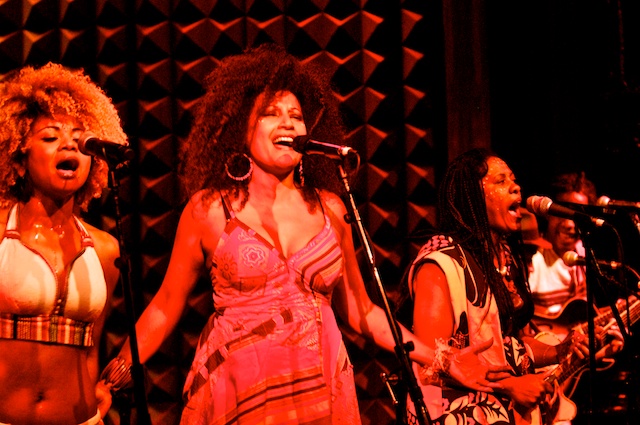 Razia with Roseliane and Eusèbe Jaojoby at Joe's Pub (Eyre 2014)
Razia with Roseliane and Eusèbe Jaojoby at Joe's Pub (Eyre 2014)
You started this tour a few days ago, right?
Yeah, we came to Montreal. The whole band was flown from Madagascar, arrived in Montreal on the 4th of July and we did a little thing for the Malagasy community in Montreal, and then we started the tour in Chicago. We did three concerts in Chicago, and now we have Nuits d’Afrique tomorrow. And the day after tomorrow, we have Toronto. And then we have Yoshi’s in San Francisco on the 19th, Joe’s Pub on the 22nd. Ginny’s Supper Club uptown on the 24th. And then we’re out to Madison, Wisconsin on the 30th.
How many tours have you done?
This is the third one. 2011 was Mifohaza Masoala. And we’re doing the second tour as Wake Up Madagascar, as it is called now. The project takes time to develop and I think we’re doing pretty well. The awareness is getting bigger and bigger and it seems like people are really interested in hearing more about what this is about and what we have to say and our goals.
Let’s talk about the music a little bit. I know Jaojoby is a salegy artist.
Yes, Jaojoby is the King of Salegy. And he’s been doing salegy forever. He’s known all over the world for his salegy. And he’s quite a personality. If you’ve never met him, you’re going to meet him tonight [Laughs]. Jaojoby is doing salegy. And his wife is doing a salegy that is more tradition with backing vocals. All of us have a lot of backing vocals, because in Madagascar that’s what we have. But she’s doing more of a traditional approach. It’s more about women’s issues and social issues. And Charles Kely is a virtuoso guitarist. He’s doing more of a Malagasy-based music that travels a little bit--that goes to Brazil and goes to jazz. It’s a really nice combination. And then I’m presenting some songs off my new album Akory. That is definitely based on Malagasy music, as well, but it’s more of a fusion sound, mixing, of course, Madagascar with a little bit of the New York thing. Charles is going to open the show with his guitar, and then he plays with me. We change drummers in the middle of the set. Charles and I have a drummer actually who is from Suriname: Harvey Wihrt. Then there’s Nono, the drummer of Jaojoby, who takes over for the set of salegy with Saramba first and then Jaojoby. Then, at the end of the show, we will all do a song from my album Zebu Nation called “Mifohaza,” which means “wake up” in Malagasy.
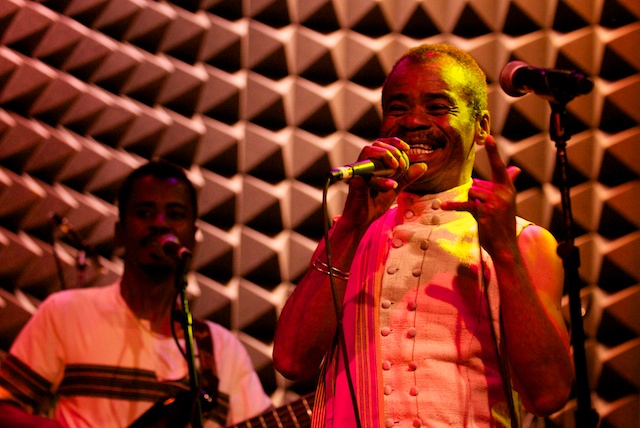 Jaojoby at Joe's Pub (Eyre 2014)
Jaojoby at Joe's Pub (Eyre 2014)
Has your new album come out yet?
No. It hasn’t come out yet. A lot of people have been waiting for it, but it’s coming out this fall in Europe and this winter in the States.
Is it going to be similar to Zebu Nation or are you doing different kinds of styles with this one?
It’s becoming a little bit more roots, so it’s a different sound. It’s a whole different crew of people, who are working on it. I actually invited a lot of huge names from Madagascar. There’s one song that I’m doing with D’Gary. There’s Rajery in there. There's Charles Kely, there’s Teta. There’s Regis Gizavo. It’s definitely much more of a deep Malagasy groove kind of thing. So anyway, you’ll find out [Laughs].
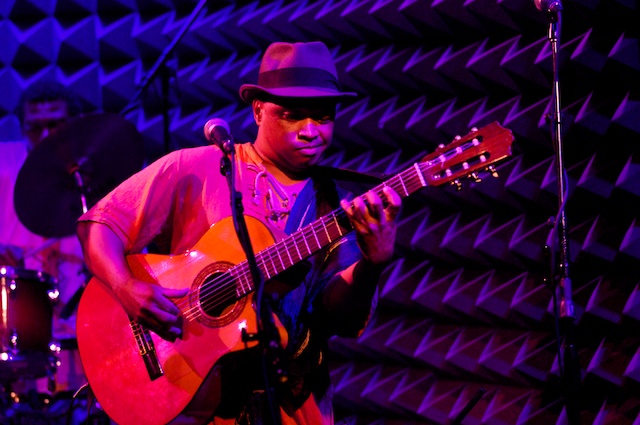 Charles Kely at Joe's Pub (Eyre 2014)
Charles Kely at Joe's Pub (Eyre 2014)
I’m looking forward to it. So, earlier in your career, you were doing more sort of r&b stuff?
The first album that came out, which was called Magical, was more sort of r&b, jazz with really a little touch of Malagasy in there. And then, I didn’t feel really comfortable with it--as comfortable as when I went to Madagascar and started singing in Malagasy. And I thought, oh my God. Even though I didn’t speak Malagasy fluently at this point, this is my mother tongue. It just felt right and was sitting right with my voice. I really wanted the Malagasy people to understand what I was talking about and also make them aware that I was really trying to communicate with them. I think they really appreciated that. On my new album, one of the songs I do in Malagasy, then in English, and then the next song is in French, because I also was raised in France.
Right. So have you had to relearn Malagasy?
Yeah. I’m totally relearning Malagasy. And, of course, for the text, I have to work with someone in order to get them right. But I can’t wait to write it all by myself [Laughs]. The idea is to spend more time in Madagascar, and of course, having this whole Malagasy group with me is great, because I’m totally submerged in Malagasy. It feels really good.
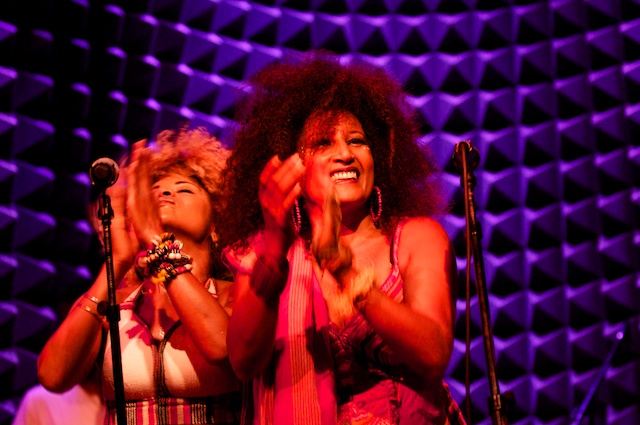 Roseliane and Razia at Joe's Pub (Eyre 2014)
Roseliane and Razia at Joe's Pub (Eyre 2014)
You were born in Madagascar, but then you grew up all over--in Africa and Europe.
I was born in Madagascar, stayed there until the age of 11, and was mostly just speaking Malagasy really. There are a lot of different dialects. I was speaking mostly the dialect of Betsimisaraka from the northeast. My mother got married to a French person, who moved to Gabon--to West Africa. So I spent some time in West Africa, which was a really great time in my life. I really love that part of the world. And then I went to boarding school in France, and stayed in France until I did my PhD in pharmacy, with a lot of stints in other places. I spent a year in New Caledonia, spent some time in Italy, some time traveling around, and then I ended up in New York.
Wow. I didn’t know you had a PhD. You were a pharmacist?
Yes. Yes. At a certain point, I was a pharmacist, and that’s what really allowed me to pay for my first two CDs. So I should never never talk badly about that time.
That’s a lot of work to get a PhD, right?
Yeah, but everything’s a lot of work when you talk about it. If you want to do it right, whatever you do is a lot of work. I mean, you’re talking about work… I don’t think I’ve ever worked as hard as I have to put together this Wake Up Madagascar tour [Laughs], which is a day and night thing, with different time zones and the visas--what a nightmare. They make it so complicated for musicians to get visas. My God. It’s a lot of work. For that kind of thing, it takes at least six months of your life. That’s why I jumped 2013.
Did you always know you wanted to do music?
Yeah, I was on stage when I was 10 with my uncle’s band. He’s a bad guitar player. And he lives now in Congo, unfortunately. Otherwise, I’d be playing with him. He used to play the guitar and asked me to sing along with him, since I was very very little. He was asked to perform in this big stage--the common place where people perform, where people have ceremonies. And he didn’t have a lead singer. So he said, “OK, you’re going to be the lead singer.” And I was like, OK [Laughs]. And then as soon as I was on stage with the band and everything, I thought, Wow, that was the most fun! That’s what I want to do.
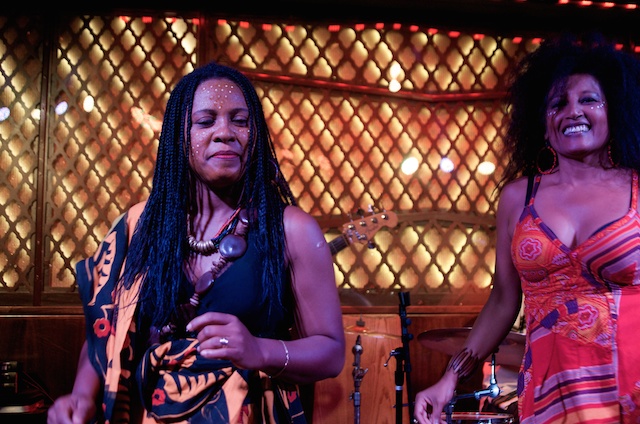 Eusèbe and Razia at Ginny's Supper Club (Eyre 2014)
Eusèbe and Razia at Ginny's Supper Club (Eyre 2014)
So you started young.
And then after that, there were all kinds of things that I was not expecting, so I didn’t get into the music right away. Something that really stopped me from getting into it, from the beginning, was that I didn’t play an instrument. So, when I came to the States, that’s the first thing I did. I started taking guitar lessons. And that’s when I started writing my songs. I never really wanted to sing someone else’s songs. I wanted to write my own songs. I’m a lefty, so every time I said to people, “Teach me. Teach me,” they would say, “You’re a lefty, so you should be taking it like this or like that.” Of course, now, I play guitar--whatever little play--I play like a righty. At a certain point I thought, I’m going to have to face this and do it and write my songs.
Are the songs that you’ve written for the new album about the same sort of things that you’re doing for Wake Up Madagascar?
Yes. But again, it just takes a bit of a different turn. I think the way that I did it with Zebu Nation was more suggestive and this one is more in your face. I realized also that there were some things that needed to be said about these political uncertainties in Madagascar. So I got deeper into that. Jaojoby heard it and said, “I like the lyrics.” [Laughs] So, let’s see, you know.
Do you play with Jaojoby at all?
No. This is the first time that we’re doing it together. And actually, because his band is the whole backbone of Wake Up Madagascar, we’re playing with his sons. One is Jackson, his bass player, and Lucas, his electric guitar player. And his daughter is also dancing and singing in the group. You’ll see, there are a lot of people performing and it’s all intertwined. It’s challenging for me, because the kids came, and we had two days to practice this new album. I was singing four tunes from the new album. So they had to get it in really fast, but it’s nice also. It’s very interesting to see the approach that they have, as opposed to my band in New York that’s much more aggressive. This is more laid-back Malagasy style.
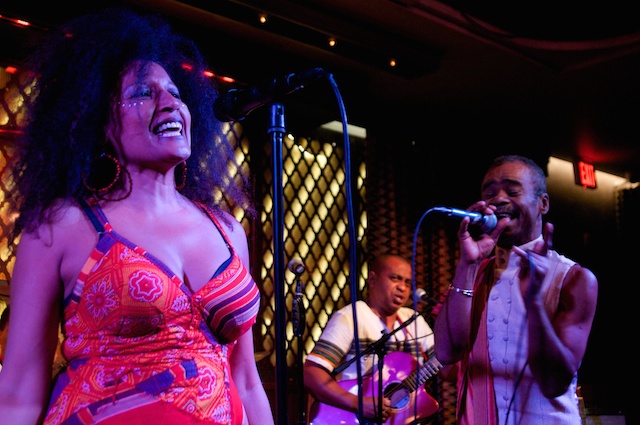 Razia and Jaojoby at Ginny's Supper Club (Eyre 2014)
Razia and Jaojoby at Ginny's Supper Club (Eyre 2014)
To get back to the environmental aspect a little bit, how long has this illegal logging been going on?
Illegal logging has been going on for a long time, but it escalated once we had the coup in Madagascar in 2009. Whenever there’s political instability in developing countries, there’s not so much control over things like that. People take advantage of that situation by getting a lot of the stuff out that’s not supposed to go out. There’s illegal logging. There’s also animal trading. There are a lot of turtles that are being taken from Madagascar and sold on the illegal market. There are a lot of things that are being sent to China, to Asia. The wood to do furniture and turtles for medicine or whatever they’re doing--to improve virility of men [Laughs]. It’s really a huge huge problem. And, of course, the people that are cutting the wood are also killing the lemurs on their way there; they’re eating the lemurs. A lot of people also do illegal trading of these animals. So I work a lot with conservation people, like at the Lemur Foundation, and at the Lemur Conservation in the States, where they’re trying to get some lemurs from Madagascar to protect them. Over there, we have no control over what’s going on, so this is why we want a piece of forest that we can control and show people we can actually keep a few species alive. They’re doing a really good job in Ranomafana. That forest in the middle of Madagascar is really well preserved. They found alternative ways to promote sustainable economic ways of living. There’s livelihood; there’s all this tourism; there are roads that go there. Tourists go there, so they have hotels, restaurants. They really got it right in that place. In the Masoala area, it really needs to be done, because that’s where most of the illegal logging is going on at this point. And it’s really super urgent to do something about it now.
I think really something that’s fascinating about Madagascar is that, because it’s an island, there are all these animals that you don’t find anywhere else in the world, like the lemur.
Exactly. And they’re finding all kinds of animals and insects that nobody knew about. Like, “Oh we have a new species of chameleon,” you know? All of that is because Madagascar has been cut from the big island of Africa 100 million years ago, and all the species managed to stay alive. A lot of them because they didn’t have all the huge predators. But I think also, there’s a climatic thing. People always say, “This should have been the promised land.” Even now, when you speak about Madagascar, people always say, “Wow, what a place. I would really love to go there. That must be paradise.” It was paradise, you know? It really was paradise. The population is the sweetest and most welcoming. This country has so much to offer, on every level. And it’s a country also that’s very rich. We have gas; we have natural gas; we have petrol, semi-precious stones. We have all kind of things there. And then we have this amazing vegetation. We have these endemic species. It’s such a pity. It’s such a loss for the world to let it go. Because it’s such a special place.
And also culturally, because it’s isolated, there are so many different styles that you don’t find anywhere else.
Yes. When you hear music from Madagascar, you know that it’s from Madagascar. It’s a very specific sound, specific rhythms, specific instruments that we play only there. And everyone makes their own instruments. We are the masters of string instruments there. Everybody plays guitar at every corner of the village. They make their own guitars. We have all kinds of guitars. The ones with two strings, with three strings. We make it with nothing. Every kid makes their little instrument. There’s the lokanga, this violin, the valiha, the marovany.
Roseliane at Joe's Pub (Eyre 2014)
Everything’s handmade?
Yeah. And actually in the village where my grandmother comes from, I was there two years ago, and I’m going there again, because I’m doing a program bringing school supplies to the little school there. They asked me, “Can you bring us a real made guitar--a guitar like they make in a store?” And I thought that was such an amazing request, so that’s one of the things I’m taking with me this time.
Do people play mostly acoustic or electric instruments now?
Acoustic, of course. They make everything themselves. They don’t have the pickups and the amps. You have to keep in mind, it’s a very poor country. And the strings are made usually with nylon that they get from fishing poles. That’s how they created the kabosy and all these different instruments. Musically, it’s so amazing. For the music, for the human side, and for the nature. Those three things are really unbelievable in Madagascar.
When you were living in Gabon, did you find music that influenced you?
Absolutely. Come on, this was where I was exposed to Fela, Pierre Akendengué, all these people. A lot of the Congolese people also--Franco, and all these people came to Gabon. And people in Gabon really listened to this music a lot. That was great. The soukous and all of that.
You’ve got a little bit of everything.
Exactly. I’ve got a little bit of everything. But the Malagasy roots are definitely very strongly there. So that’s what I want to do with my music--is really to try to keep those roots of Malagasy, but take it elsewhere, and making it travel a little bit.








